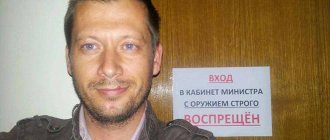Alexander Merkulov (Chudinin)
In May 2020, after many years of unrest, two souls in love, separated by circumstances, were finally reunited. An insurmountable obstacle turned out to be a new round of investigation and judicial proceedings in the case of an attempt on the life of St. Petersburg businessman Sergei Vasiliev, which occurred 11 years ago. Another St. Petersburg businessman Alexander Merkulov and the most popular Russian pop singer Tatyana Ovsienko experienced the joy of meeting after a long separation. The court put an end to a crime that had long been considered unsolved.
Alexander Merkulov, recognized by the court as the main organizer of the assassination attempt, was born and raised in Ryazan. His rather unremarkable biography became somewhat livelier after he got tired of working as an ordinary “bomb-taxi driver” on the streets of a provincial regional center and, having met the local gang, he joined the group of the so-called “Osokinskys.”
Leaders of the Osokin group
The physically strong Merkulov, even now, on his half-century anniversary, gives the impression of a strong, athletic man to those around him. The Ryazan gang was engaged in the usual business - racketeering, and its ending also turned out to be quite predictable. The top of the group was detained by the police and went to serve their sentences in correctional colonies. Ordinary members fled in all directions.
In the 90s, Alexander Merkulov met singer Tatyana Ovsienko, who then tried to play the role of his guardian angel.
In the ranks of the Tambov organized crime group
Merkulov moved away from Ryazan, which had become dangerous, to St. Petersburg. Impressed by the unenviable fate of his acquaintances, he first tried to engage in a completely legal business, organizing an office for collecting scrap metal and “flower garden.” Other “elephants” also settled in the northern capital over time. Having met again far from their home, they decided to diversify their lives with the experience of a turbulent past. The newly formed brigade joined the strongest St. Petersburg criminal group - the Tambov organized crime group. Merkulov in St. Petersburg often used a second identity card with the surname Chudinin. It was from her that he was driven into the organized crime group ─ Sasha Chudnoy.
Kumarin Vladimir Sergeevich
Alexander Merkulov is a great driver, quite often he gave rides to the leader of the criminal community, Vladimir Barsukov (Kumarin), on business and over time began to enjoy his exceptional trust. At the beginning of the 2000s, Tambov residents tried with all their might to take over the city’s gasoline business. Fulfillment of the strategic task forced them to seriously engage in a very important facility, without which their monopoly would not become final - the St. Petersburg oil terminal.
Sergei Vasiliev was in charge of its affairs, who showed extreme intransigence and did not want to voluntarily pay monetary compensation to Barsukov for the latter’s contribution to the creation of the business. Having become one of the co-owners of the terminal, Vasiliev believed that he could solely dispose of the assets, and he did not see any debts to anyone. The oil business helped him enter the list of ruble billionaires. However, he “squeezed” several tens of millions of rubles for his former patron and put his life on the line.
Leader in organizations
Merkulov Vladimir Vasilievich head of 3 organizations. The list of companies is sorted in descending order by registration date.
JSC "MERKULIN" Liquidated
- Extraction of gravel, sand and clay
- Position: President
- Moscow region
- Registration date: 06/28/2007
- OGRN: 1075027009584
- INN: 5027123746
PA "INTERNATIONAL COOPERATION "GOLDEN AXIS" Liquidated
- International activities
- Position: Chairman of the Council
- Moscow region
- Registration date: 02/25/2003
- OGRN: 1035008252641
- INN: 5041022404
CONSUMER COMPANY "IPK"GOLDEN AXIS" Liquidated
- Type of activity not defined
- Position: Chairman of the Council
- Moscow region
- Registration date: 05/28/2002
- OGRN: 1035008254170
- INN: 5041021432
Assassination attempt on Sergei Vasiliev
The attempt on the life of Sergei Vasiliev was carefully prepared. At the corner of Levashovsky Prospekt and Ordinarnaya Street, his jeep was tightly blocked by a car driven by Tambovets Vyacheslav Yezhov. His participation in the crime will be assessed at 7 years of strict regime. 2 killers jumped out of another car ─ the Mikhailov brothers, who opened heavy fire from Kalash rifles. The businessman was wounded along with 2 personal security officers. Another bodyguard, Georgy Pozdnyakov, died on the spot. Vasilyev’s life was saved by the skill of the driver and the miraculous failure of the car’s engine to stall. The car was able to take off from a standstill and drive only 100 meters from the ambush site, but this was enough to get out of the line of fire and gain time until the police arrived. The criminals did not tempt fate by further pursuing the victim and chose to immediately escape.
Owner of the St. Petersburg oil terminal Sergey Vasiliev
All participants in the attack became known to the investigation several years later from the testimony of witnesses in the case of the leader of the Tambov gang, Vladimir Barsukov. St. Petersburg raider Albert Starostin, who became the main oracle at the trial, pointed to Alexander Merkulov’s participation in organizing the assassination attempt. By that time, Barsukov’s henchman had fled to Ukraine, choosing the resort of Yalta for refuge. The escape occurred immediately after the arrest of the St. Petersburg boss in 2007.
Death
Vasily Merkuryev worked until the last days of his life. He said goodbye to TV viewers by playing a small role in the romantic comedy “Ksenia, Fyodor’s Beloved Wife,” which was released 4 years before his death.
He did not stop working in the theater, and worked without understudies. The last time he appeared on stage, he played a role in the play “While the Heart Beats.” In the 2000s, a documentary about the great artist was released under the same name.
The star went out on May 12, 1978. At the funeral, as he bequeathed, they played his favorite song performed by Fyodor Chaliapin. There is a legend that a tear rolled down the artist’s cheek at that moment.
Merkuryev was buried on the Literatorskie Mostki.
Escape from Russia
In Ukraine, Merkulov lived under the name Mazurenko, hiding his real name even from his passion. The former Sasha Chudny was put on the international wanted list. Unfortunately for him, “Euromaidan” was still just maturing in the minds of Ukrainian politicians. Russian criminals did not feel as at ease in the neighboring state as they do now. In February 2011, Merkulov was arrested, placed in the Simferopol pre-trial detention center, and 10 months later he was handed over to the Russian authorities. Merkulov-Mazurenko desperately resisted, trying to take advantage of refugee status, but all his and his lawyers’ efforts were in vain. So, from the sunny resort he ended up in the gloomy “Matrosskaya Tishina”.
Alexander Merkulov and Tatyana Ovsienko
The investigation lasted almost 3 years. The prosecution's attempt to prove to the court the personal participation of the Ryazan "Tambovits" in the attack on the businessman failed miserably. The jury acquitted him and the accused, to Ovsienko's delight, was released right in the courtroom. The guilt of Kumarin and another defendant Drokov also could not be established. The only unlucky person was Alexander Korkushov, who was detained and deported from Ukraine, along with the singer’s common-law husband. He had to suffer for everyone. According to the verdict, he was sent to prison for 11 years.
Vyacheslav Drokov
The Supreme Court of the Russian Federation soon overturned the scandalous verdict of the jury and Merkulov was again taken into custody. The next attempt to achieve fair retribution occurred in August last year. This time, Merkulov's role was limited only to participation in organizing a crime, for which he received 4 years. The 3 and a half years already spent in a pre-trial detention center counted towards the punishment. For the remaining 6 months before his release, Alexander Merkulov spent his time in the special unit of the same “Matrosskaya Tishina”.
The court established new links in the assassination scheme. For fulfilling the order, Vladimir Barsukov transferred money to Merkulov through his authorized representative Vyacheslav Drokov, nicknamed Zina. The former “elephant”, having received an advance, took upon himself the responsibility of finding the killers. On the day of the attack, another member of the Tambov organized crime group, Alexei Ignatov, delivered weapons and hid them in the car, into which the brothers Oleg and Andrei Mikhailov, who began their journey among the Ryazan “elephants” and had experience in contract killings, would sit a little later.
Alexander Merkulov and Tatyana Ovsienko
All those involved in the attempt on Sergei Vasiliev will sooner or later be detained and receive a fair punishment. The direct executors of the order will receive the most punishment - 20 years in prison. All the years until Alexander Merkulov’s guilt was finally proven, his common-law wife Tatyana Ovsienko stubbornly fought for his fate. She hired the best lawyers for him, regularly sent packages to the pre-trial detention center, went to all court hearings and sincerely believed in his innocence. While Merkulov was in the cell, Tatyana Ovsienko became a member of the Commission of the Public Council under the Ministry of Internal Affairs of the Russian Federation. Perhaps, in this way, she tried to find those threads of influence on the situation that would help her, if not rescue her lover from the dungeons, but at least somehow alleviate his fate. After their release, Alexander and Tatyana’s immediate plans are to officially register their relationship, creating a new unit of society. The burden of the past and the mistakes of the spouse’s stormy youth cannot now darken their lives. As they say: “To freedom ─ with a clear conscience.”
Vsevolod Merkulov - why the strangest Soviet security officer was shot
On December 23, 1953, former People's Commissar of State Security Vsevolod Merkulov was shot. At one time, he was a close ally of the powerful Lavrentiy Beria, and this is what ruined him. Although Merkulov himself was not too dangerous to Khrushchev, Malenkov, or the others, his too close relationship with the disgraced Beria, in whose inner circle he was a member for about 30 years, predetermined his fate.
Merkulov was the most unusual People's Commissar of State Security in the history of the USSR. Neither by his origin, nor by education, nor by political and ideological views, it seemed that he could not have a place in such a specific organization.
A quiet, shy, well-educated nobleman who secretly always dreamed of being a writer - could anything be more inappropriate for the post of head of state security in that era? Let's find out the story of the strangest Soviet security officer.
Youth
Vsevolod Merkulov was born in 1895 on the territory of what is now Azerbaijan, at his father’s place of service. Father is a captain in the imperial army and a hereditary nobleman. Mother is Georgian, also from the nobility. When Vsevolod was still very young, his father came under investigation for alleged embezzlement of government funds, and then went to court for a long time, considering himself a victim of slander. He died when his son was 13 years old.
Coming from a very intelligent family, Merkulov was fond of creativity since childhood. He drew quite well, and even while studying at the gymnasium, he tried to write short stories and notes. By the way, he graduated from the Tiflis gymnasium with a gold medal and went to study at St. Petersburg University, where he entered the Faculty of Physics and Mathematics.
In the capital, he worked part-time as a tutor and would have successfully graduated from the university if not for the war. In 1916, as a third-year student, he was mobilized into the army. Due to the need to train a large number of officers, students were often sent to accelerated courses at schools for warrant officers (junior officer rank).
Merkulov was also sent to one of these schools, in Orenburg. After four months of study, he was released as an ensign to one of the reserve regiments.
But he never had the chance to fight. A few weeks before graduation, the February revolution occurred. From that moment on, the natural course of things was disrupted, purges of monarchist officers began in the army, soldiers stopped obeying officers, and collapse began.
In October 1917, Merkulov was nevertheless sent to the front, but by that time the army was no longer conducting any combat operations and had completely disintegrated. After spending almost three months on the Southwestern Front, Merkulov left for Tiflis, where his relatives lived.
The Mensheviks
By that time, the Mensheviks had seized power in Georgia and held it for three years. They were much less bloodthirsty than the Bolsheviks, so against the backdrop of the nightmares of Soviet Russia, everything was relatively quiet in Georgia and it was possible to wait out the turmoil safely there.
Nevertheless, noble origin and officer's shoulder straps were not the best recommendation even for the Mensheviks. So for several months Merkulov could not find any work. Then he became a clerk at a school for the blind, the director of which was his mother. Later he also became a teacher at this institution.
Among other things, he also published his own handwritten magazine, which he sold to anyone for a small fee.
There he married the niece of the tsarist general and active figure in the Provisional Government, Yakhontov. By the way, the general later lived in the USA and this relationship did not in any way interfere with Merkulov’s career, which, however, is understandable, given the level of his patronage.
In the Cheka
In 1921, the Bolsheviks seized power in Georgia, and Merkulov ended up in the Cheka. The circumstances under which he became a security officer are vague. An absolutely apolitical officer-nobleman who had nothing to do with the revolutionary underground, married to the niece of a tsarist general - even one of these points was enough to keep such a person away from the Cheka and from a cannon shot. With such a biography, one can only be glad that he remained alive, no matter what the Cheka is.
Considering the above, the circumstances of his entry into the Cheka could only be extraordinary. Merkulov himself, already during interrogations in 1953, claimed that he managed to enter the service as assistant commissioner of the Economic Department thanks to the help of Georgian friends who put in a good word for him.
However, during the years of the Yezhovshchina, the NKVD received an anonymous denunciation against Merkulov, in which it was reported that he was a “white man” (i.e., a White Guard) and was forced to work as an informant for officers. Moreover, he flatly refused and surrendered only after several beatings in the “cellar” of the local Cheka.
However, you should not blindly trust an anonymous person. If only because informants were extremely rarely included in the Cheka staff and became regular employees. In addition, there were no White Guards in Georgia, because... The Mensheviks were at enmity with them and even fought for Sochi.
However, even after ending up in the Cheka, Merkulov was a black sheep for a long time. Despite his persistent efforts to join the party, he was repeatedly denied this privilege. Only in 1927, at the request of the then powerful Beria, was Merkulov still given a party card.
Beria
A few months after Merkulov entered the service of the Georgian Cheka, Beria came and immediately became deputy chairman. Of course, he could not help but pay attention to such a subordinate, since he was in some way unique.
The Chekists in those days could not boast of education. Educated people did not want to go to the Cheka, or they were not taken there because of mistrust. So two or three years of parochial school was already considered practically higher education. A completed secondary education is already a candidate of science.
And Merkulov, with a gold gymnasium medal and three courses at the capital’s university, was practically an academician by local standards.
Therefore, in just four years, Merkulov rose from assistant commissioner to head of the Economic Department. True, this department has always been considered frankly secondary. But further career growth was just around the corner. In 1927, Beria became the head of the GPU, and Merkulova was transferred to head a more significant department - information and political control.
And finally, in 1929, Merkulov headed a key unit - the secret operational unit (at one time Beria himself held the post of its head).
In 1931, Beria was transferred from the Cheka to the Central Committee. He becomes the first secretary of the Georgian Communist Party, i.e. head of the republic. And he immediately takes Merkulov with him, who becomes his assistant. Over the next seven years, Merkulov changed many positions. In the last year before leaving for Moscow, he was the head of the industrial and transport department of the Central Committee of the Communist Party of Georgia.
In the capital
In 1938, Beria was transferred to Moscow, assigned to head the Main Directorate of State Security and made deputy people's commissar Yezhov. To fight Beria’s boss, he needed a team, and he sent almost his entire entourage to Moscow. Later, during interrogations, Merkulov claimed that, in his opinion, the reason for his rise was the fact that he was the only Russian surrounded by Beria.
He preferred to rely on his Caucasian clan, but the Kremlin did not like the fact that Beria surrounded himself entirely with Georgians, and he even had to send some of the people back. Thus, Merkulov was an ideal and guaranteed candidate for the role of first deputy.
But to explain Merkulov’s rise only with this fact would be a strong simplification. Over the years of work in Georgia, a kind of symbiosis arose between them. Beria was needed by Merkulov, and Merkulov was needed by Beria.
Merkulov himself found in Beria a powerful defender and intercessor who could protect him from any attacks. After all, he was a nobleman, an officer and, in addition, a relative of a tsarist general living in America. At any moment he could be expelled from the party, and in the 30s he could even be shot. Not only Merkulov’s career, but also his life largely depended on Beria’s patronage.
But Beria also needed his subordinate. Merkulov was well educated and smart. When Beria left for party work, he often had to give speeches. Merkulov often took on the functions of a speechwriter and wrote or edited the speeches of his boss.
He was timid and shy. He was embarrassed in front of his superiors and could not give speeches because of his shyness. He had virtually no political ambitions. Considering all this, he was an ideal subordinate and assistant: responsible, efficient and unambitious.
Just what Beria needed in high positions. Beria was sure that no trick should be expected from Merkulov, and Merkulov was sure that the powerful figure of Beria would shield him from any purges and persecution. It was a mutually beneficial collaboration.
At the end of 1938, Beria “ate” Yezhov and himself became People’s Commissar of Internal Affairs. Merkulov moved to the position of first deputy. And in 1941 he himself became People's Commissar. A few months before the war, the NKVD was divided into two people's commissariats: internal affairs, which remained under the control of Beria, and state security, which was headed by Merkulov.
However, just a month after the start of the war, the People's Commissariats were brought together again, and Merkulov was moved to the position of first deputy. Only in 1943, after another division, he returned the post of People's Commissar of State Security. The NKVD now controlled the camps, internal and border troops, as well as the police, and the NKGB was in charge of intelligence and counterintelligence.
It cannot be said that Merkulov was well suited for the new position. Remaining Beria's deputy, a man in his shadow, he bore responsibility as a performer, and not as a leader. But now he independently headed the most important department, which he had no great desire for.
So, in part, he was a figurehead who allowed Beria to maintain his influence in two people’s commissariats at once. In reality, the lion's share of the work in the NKGB was carried out by Merkulov's 1st deputy, Kobulov.
Kobulov was part of Beria’s inner circle and was one of his most trusted people. In fact, it was in the hands of Kobulov that the leadership of key issues of the department was concentrated. Two facts speak about this. Firstly, Kobulov had an unheard-of privilege - he was the only one of the first deputies who personally went to reports to Stalin.
Secondly, it is enough to compare the number of awards of two managers. Merkulov had the Order of Lenin, the Order of the Red Banner, the Order of Kutuzov 1st degree and the Tuvan Order of the Republic. Not the most impressive award list.
But his assistant Kobulov has three Orders of Lenin, five Orders of the Red Banner, two Orders of the Red Banner of Labor, the Order of Suvorov, Kutuzov and the Patriotic War of the 1st degree.
In addition, there is evidence that it was Kobulov who personally led the most important special operations of the People's Commissariat of State Security.
Creation
If Merkulov did not have any special political ambitions, he did have creative ambitions. From childhood he was partial to literary work. Perhaps, if there had not been a revolution, he would have become a writer or journalist. But even after being in the Cheka, he continued to engage in creativity in his spare time.
In the late 20s, under the pseudonym Vsevolod Rokk, he wrote and published his first play, called “Remember the Proletariat.” It was dedicated to the struggle of American underground revolutionaries for the happiness of all working people.
In the mid-30s, Merkulov took part in working on the script for the documentary film “Batumi Day,” filmed in Georgia. In addition, he personally wrote a brochure about his boss Beria.
And soon after the start of the war, already being the 1st Deputy People's Commissar of Internal Affairs, he wrote the play “Engineer Sergeev”, again under the pseudonym Vsevolod Rokk. The play told the story of the struggle of a Soviet engineer against the Nazi invaders (he had to blow up his hydroelectric power station) and was performed in several Soviet theaters, including the Maly Theater in the capital.
This was where Merkulov’s work ended, since Stalin, during one of the Kremlin receptions, learned about this secret passion of Merkulov and severely reprimanded him, saying that the People’s Commissar of State Security should catch spies, and not write plays. Merkulov, who was afraid to utter an extra word in front of his superiors, apparently took the criticism to heart and never returned to creativity.
Nevertheless, his main circle of contacts outside the service were directors, theater directors, and actors. His social circle included directors Kuleshov, Alexandrov and Kalatozov, who, apparently, were closer to his colleagues in state security.
Sunset
Soon after the war, Beria's position weakened somewhat, a new struggle between clans for power began, and Merkulov lost his post. Formally, for major shortcomings in intelligence work in foreign countries. Merkulov was deprived of membership in the Central Committee and transferred to head the Main Directorate of Soviet Property Abroad in Austria.
Of course, this was a serious demotion, but Merkulov was worried not about his career, but because he had displeased the leader with his work. However, no serious sanctions were applied to him. And in 1950, Stalin seemed to forgive him and proposed him for the post of Minister of State Control. Something like a modern Accounts Chamber, only with slightly greater powers.
Merkulov was terribly happy and wrote a letter of gratitude to Stalin: “in recent years I have learned a lot... I realized how often in the past I lacked statehood in my work: sometimes, instead of a state approach to business, I was guided, as you once correctly pointed out, by ideas” love for humanity." Now such mistakes are no longer possible for me.”
However, the minister soon began to have health problems. In less than a year, he had two heart attacks and spent more time undergoing treatment than working.
After Beria again headed the Ministry of Internal Affairs after Stalin’s death, Merkulov came to him and asked for a job. However, now Beria no longer needed him and did not take Merkulov into the ministry. Instead, he chose to appoint Kobulov as his first deputy.
But soon the situation changed dramatically. Molotov, Khrushchev and Malenkov cooperated against a powerful competitor and arrested him. This was followed by the arrests of his nominees. Merkulov was the last to be taken; for some time he went to interrogations as a witness. Only in mid-September 1953 was he arrested. At the same time, he continued to remain the Minister of State Control.
During interrogations, he tried to disown his former boss, testified against him, willingly recalled some compromising facts, admitted the use of unauthorized interrogation methods in relation to party members (although he claimed that they were deeply disgusting to him and he did this only because for orders from superiors).
However, this did not help him. Although Merkulov was an elderly and seriously ill man who did not pose any danger to the new government, it was decided to destroy all the high-ranking promoters of Beria who were part of his inner circle. On December 23, 1953, Merkulov and the rest of Beria’s closest associates were sentenced to death, and on the same day they were shot.
At the beginning of the 2000s, attempts were made to achieve the rehabilitation of Merkulov. But, unlike several of Beria’s associates, who were partially rehabilitated by posthumously changing their sentences from the death penalty to 25 years in prison, Merkulov was declared not subject to rehabilitation for his direct participation in mass repressions.










